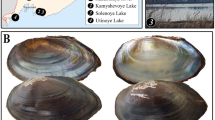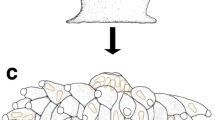Abstract
IN a preliminary communication 1 it was pointed out that members of the Tridacnidae are of a comparatively high efficiency in taking in ordinary net-zooplankton. This efficiency was attributed to the possession of members of this family of a well-developed sucking, sieving and pumping mechanism which is constituted by the different chambers of the mantle.
This is a preview of subscription content, access via your institution
Access options
Subscribe to this journal
Receive 51 print issues and online access
$199.00 per year
only $3.90 per issue
Buy this article
- Purchase on Springer Link
- Instant access to full article PDF
Prices may be subject to local taxes which are calculated during checkout
Similar content being viewed by others
References
Mansour, K., Proc. Egyptian Acad. Sci., 1 (1946) (in the press).
Vaillant, L., Ann. Sci. nat. Zool. (5), 4 (1865).
Lacaze-Duthiers, H. de, Arch. Zool. Exp. Gén. (3), 10 (1902).
Yonge, C. M., Great Barrier Reef Expedition Sci. Rep., 1, No. 11 (1936).
Author information
Authors and Affiliations
Rights and permissions
About this article
Cite this article
MANSOUR, K. Mantle Chambers of Tridacna Elongata. Nature 158, 523–524 (1946). https://doi.org/10.1038/158523a0
Issue Date:
DOI: https://doi.org/10.1038/158523a0
This article is cited by
-
Quantification of water squirting by juvenile fluted giant clams (Tridacna squamosa L.)
Journal of Ethology (2011)
Comments
By submitting a comment you agree to abide by our Terms and Community Guidelines. If you find something abusive or that does not comply with our terms or guidelines please flag it as inappropriate.



